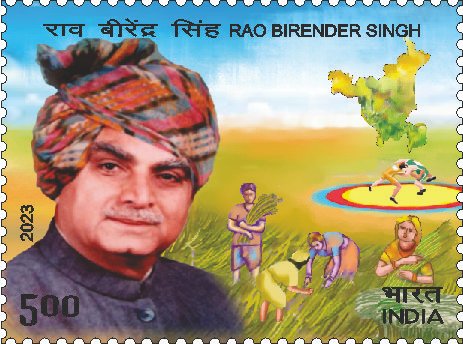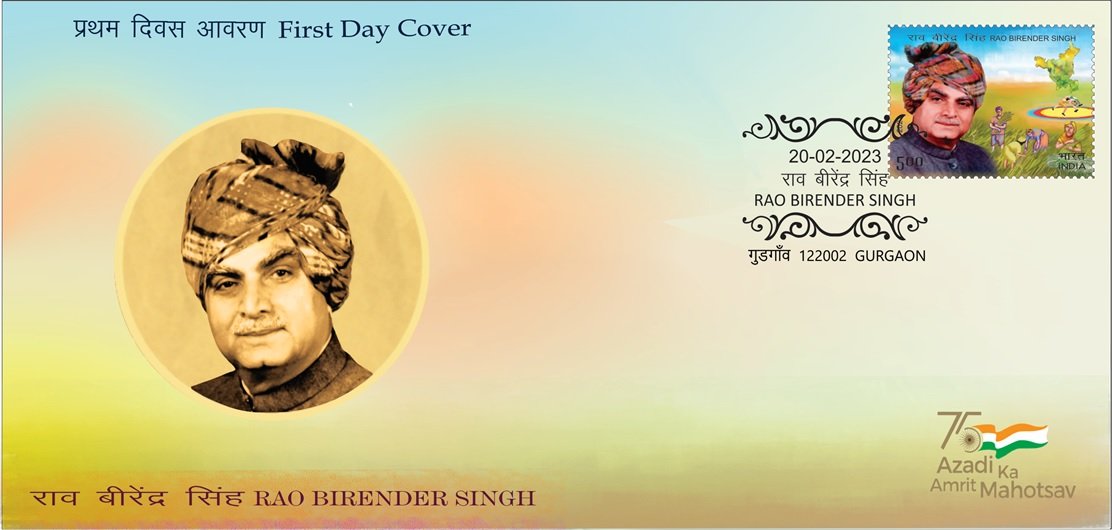Rao Birender Singh

Technical Data
| Date of Issue | February 20, 2023 |
|---|---|
| Denomination | Rs. 5 |
| Quantity | 301,805 |
| Perforation | 13¾ |
| Printer | Security Printing Press, Hyderabad |
| Printing Process | Wet Offset |
| Watermark | No Watermark |
| Colors | Multicolor |
| Credit (Designed By) | Ms. Nenu Gupta Smt. Vinita Sinha |
| Catalog Codes |
Yvert et Tellier IN 3535 Stanley Gibbons IN 3844 Colnect codes IN 2023.02.20-01 Michel IN 3870 |
| Themes | Commemoration | Famous people | Men | Politicians | Wrestling |
Rao Birender Singh – Statesman, Reformer, and Champion of Farmers
The Department of Posts is proud to issue a Commemorative Postage Stamp on Late Rao Birender Singh, Former Chief Minister of Haryana and Union Cabinet Minister, honoring his lasting contributions to India’s political and social landscape.
Born on 20 February 1921 in Rewari (Haryana), Rao Birender Singh hailed from the royal family of Rewari and was a proud descendant of Shaheed-e-Azam Rao Tula Ram, a frontline hero of the First War of Independence (1857). Educated at St. Stephen’s College, Delhi University, he went on to serve as a Captain in the Indian Army. Though selected for the Indian Police Service in 1950, he chose to continue serving in the Army to contribute directly to the nation.
Political Journey and Creation of Haryana
Rao Birender Singh began his political career in 1954, winning as an independent candidate to the Punjab Legislative Assembly. Recognizing his popularity, Chief Minister Pratap Singh Kairon inducted him into the Cabinet, where he held important portfolios such as Public Works, Transport, Revenue, and Irrigation.
In 1961, dissatisfied with the neglect of Hindi-speaking regions, he resigned and strongly advocated for a separate state of Haryana. His efforts played a pivotal role in the formation of Haryana in 1966. Shortly after, he became the first Speaker of the Haryana Legislative Assembly and in 1967, he was elected Chief Minister of Haryana, where he initiated welfare measures for the state’s development.
National Leadership
In 1971, Rao Birender Singh entered Parliament, representing Mahendragarh Lok Sabha Constituency on a Vishal Haryana Party ticket. His cooperation with Prime Minister Indira Gandhi during challenging times led to his appointment as Union Minister for Agriculture, Rural Development, Irrigation, and Civil Supplies in 1980.
One of his most significant achievements was facilitating the historic Ravi-Beas Water Agreement (1981) between Punjab, Haryana, Rajasthan, and the Union Government, paving the way for equitable water sharing.
As Union Agriculture Minister, his policies ensured that farmers received the best prices for their produce, giving rise to the slogan: “Rao Aaya, Bhav Aaya” (With Rao comes better prices). During his tenure, food grain production in India rose from 107 to 185 million tonnes annually. As Civil Supplies Minister, he approved the landmark Consumer Protection Act, which led to the establishment of consumer courts across the country, empowering citizens.
In 1984, he continued his service under Prime Minister Rajiv Gandhi as Union Agriculture and Food Minister. However, in 1985, he made history by resigning from the Cabinet on the floor of the House in opposition to the Rajiv-Longowal Agreement—the first such resignation in independent India made in the public interest.
In 1989, Rao Birender Singh was elected to the Lok Sabha on a Janata Dal ticket and served as the Union Minister for Food and Public Distribution in Prime Minister Chandra Shekhar’s Cabinet.
Voice of the Farmers and the Marginalized
Throughout his career, Rao Birender Singh remained a strong voice for farmers, underprivileged communities, minorities, and backward classes. As the President of the All India Yadav Maha Sabha, he consistently advocated for their representation in legislative bodies and local institutions.
Legacy
Rao Birender Singh passed away on 30 September 2009 at the age of 88. His life remains a shining example of courage, integrity, and dedication to public service.
The Commemorative Postage Stamp issued in his honor pays tribute to a statesman who played a vital role in shaping Haryana’s identity, advancing farmers’ welfare, and upholding democratic values in independent India.
First Day Cover

